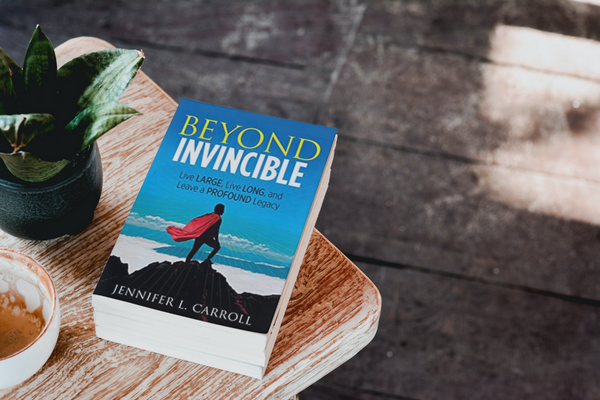Sometimes the threat of loss—even death—is what it takes for us to see what really matters and how to live life with passion and gusto. Here are four actionable strategies for living your best life, courtesy of a rock-star entrepreneur who lived life out loud.
This report is reprinted with permission from VFO Inner Circle.
KEY TAKEAWAYS:
- Positive attitude + positive action = profound success.
- Progress can be slow – but focus is power.
- Value your health as much as you value your business career.
Phil Carroll was a self-proclaimed rock-star real estate investor and entrepreneur who made his first million dollars in his 20s selling luxury houseboats and ramping up from there.
But at age 47, everything changed: He was diagnosed with prostate cancer. While most men survive such cancer, Phil died from it five years later.
His wife, Jennifer, began a journey as a speaker—sharing the “live large, live long” way Phil approached both his life and his death. She ultimately wrote a highly engaging book about her late husband and their life together called Beyond Invincible: Live Large, Live Long and Leave a Profound Legacy. Today, Jennifer runs Illuminate You, a two-day retreat for women.
In the book, Jennifer offers what she calls Phil-osophies— lessons that her husband implemented throughout his life, including his final years. They’re lessons we believe will resonate strongly with anyone who wants to live their best life and give it all they’ve got—for themselves, their profession, their family and the world at large.
Lesson #1: Be positive – especially when times are dark
This is “easier said than done” advice, of course, and it’s not always possible. But there are ways to increase and maximize the positivity you bring to situations, particularly the challenging ones that can really derail you.
The first step to being positive is to actively repel the negative. When confronted with challenges and problems, reframe them in terms of the opportunities they present you with. This requires an ability to put on rose-colored glasses now and then. In doing so, you can create a foundation from which to build positive thoughts and actions. Jennifer writes that Phil “was like a superhero with those bullet-deflecting wrist guards. As negative stuff came at him, he just stuck up his wrist guards and blocked those bullets.”
Visualization can also be key to staying positive. Filling your space (home, office, etc.) with positive visions of what you want from life can be surprisingly effective. One technique: Create a vision board—a corkboard or magnetic board with pictures of your goals and aspirations—so you can literally see the images of things you dream about achieving in life. A vision board might also contain positive words of affirmation—“You can do it!,” “Make it happen!” or even simply “Yes!” This isn’t a particularly revolutionary strategy—and it’s not hard to implement—but it can potentially have a powerful impact on how you approach your life and your goals.
You can also visualize positivity on the go. For example, on their way to the rink, Phil would regularly help his hockey-playing son visualize in detail the moves, plays and goals he wanted to make during games. Eventually, his son was signed by the NHL’s Calgary Flames. “I put this gift my dad gave me to work every day,” he says in Jennifer’s book.
The takeaway: Do you feel bogged down by the challenges in your life? Are you losing sight of your dreams and what you love to do? If so, try visualization techniques. What images would you put on your vision board? What wise words do you need to see and remind yourself of on a daily basis?
Lesson #2: Stay focused
All the energy and positivity in the world won’t have a huge impact unless you focus them in ways that help you move forward. One of Phil’s key success strategies was to pick a field and stick with it. Ask yourself: What is your unique ability? What gift do you need to share with the world, and are you spending time honing and mastering it? Are you focused on being the best you can be?
That focus can include both business and life. If you’re a business owner, for example, it can be easy to be tempted by every “shiny object” that comes your way. But top entrepreneurs typically play to their strengths, knowing that “opportunities” that they’re not fully prepared to take advantage of aren’t really opportunities at all—they’re distractions.
Focus is also important to health. Jennifer writes that while Phil was ill, he would wake up “with one thing in mind: 100 percent focus on health and healing.” He worked out with a trainer each week, did hand-eye coordination drills, visualized his cancer cells dying off one by one, and went for daily walks—knowing that his focus on putting one foot in front of the other meant he was still fighting.
Lesson #3: Keep swimming
Even when we arm ourselves with positive focus on what we do best, life will intrude and knock us down. The key in those moments is to heed the advice of Dory in one of the family’s favorite movies, Finding Nemo: “Keep swimming!”
This is especially good advice during a health crisis or life-threatening illness. For example, when Phil could no longer work out as he had done when healthy, he still exercised a few times each week—even if just for 15 minutes per session. Jennifer writes that eventually his fitness routine shrank to first walking from the front door to a large rock in the yard, then a bit farther the next day to the lemon tree. Then around the property, and so on.
The upshot: Not all progress in life comes in big moves or giant successes. A lot of it occurs in small stages, and it can sometimes feel like wading through wet cement. But progress can happen only if you keep swimming.
Lesson #4: Be proactive about your health
After Phil’s death, his daughter Jessica asked Jennifer if he had done something wrong. Technically, he hadn’t, Jennifer consoled her. But Jennifer did say this: “If Dad had been more proactive about his health, and had yearly physicals like you and I and many others do, maybe he could’ve been diagnosed early. Maybe that could’ve saved his life, but we’ll never know.”
One of the biggest lessons we can learn when someone dies young is the importance of taking good care of ourselves. Think about it: If you want to live a great life and leave an amazing legacy, it seems pretty smart to stick around for a long time!
And yet, as the book notes, Phil avoided doctors for most of his life—rarely if ever getting physicals and other health-related tests. He ate organic foods and exercised regularly (even competing in marathons and triathlons). But he also ignored certain warning signs of trouble that—if checked by a doctor—could possibly have led to earlier detection of his cancer.
Consider, for example, that according to the American Cancer Society, one in seven men will be diagnosed with prostate cancer during their lifetime. About one man in 38 will die of prostate cancer. But if the cancer is detected early, the patient has a 96 percent chance of surviving at least 15 years.
Think about how much time and energy you spend on issues that you see as deeply important to your life, success and legacy. If you’re an entrepreneur or executive, consider the weeks and months you might spend examining a business deal for opportunities and risks—and how fast you move to fix a potential problem.
The message: Make the call to your physician, book the appointment and get checked—if not for yourself, then for your spouse or partner or children. It’s time to start treating your health with as much care and thoughtfulness as you treat your bottom line. Be proactive today so the “movie of your life” is a long and impactful one!
Living your dash
As you consider Phil’s and Jennifer’s lessons, think about this. Our lives are in the “dash” between our birth date and our death date. Are you living your dash as you want to, in a way that positively impacts the people around you now and will continue to impact them after you’re gone?
VFO Inner Circle Special Report
By Russ Alan Prince and John J. Bowen Jr.
© Copyright 2020 by AES Nation, LLC. All rights reserved.
Get in Touch!
Set up an appointment at your convenience:






